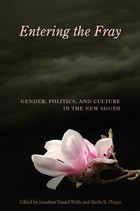2 books by Wells, Jonathan

Debris
Jonathan Wells
Four Way Books, 2021
In Debris Jonathan Wells is concerned by the tension between the internal world of the lyric and an external world of violence and intrusion. Following this conflict through poems of rumination, imagination and increasing threat, the book resolves in a eulogy that is simple and touching. In one of the opening poems, “Notes from the Invasion”, the speaker asserts, “The worst has happened. There is nothing/to imagine,”. The collection as a whole asks us to consider the questions: without imagination, what is left of the poem and the mind in a time of catastrophe? How are we to find peace? Experience love? Wells invites us to join him in the lyric’s journey, to shelter in reading, and to travel in the imagination in order to protect the self from danger and risk without denial.
[more]

Entering the Fray
Gender, Politics, and Culture in the New South
Edited by Jonathan Daniel Wells & Sheila R. Phipps
University of Missouri Press, 2009
The study of the New South has in recent decades been greatly enriched by research into gender, reshaping our understanding of the struggle for woman suffrage, the conflicted nature of race and class in the South, the complex story of politics, and the role of family and motherhood in black and white society. This book brings together nine essays that examine the importance of gender, race, and culture in the New South, offering a rich and varied analysis of the multifaceted role of gender in the lives of black and white southerners in the troubled decades of the late nineteenth and early twentieth centuries.
Ranging widely from conservative activism by white women in 1920s Georgia to political involvement by black women in 1950s Memphis, many of these essays focus on southern women’s increasing public activities and high-profile images in the twentieth century. They tell how women shouldered responsibilities for local, national, and international interests; but just as nineteenth-century women’s status could be at risk from too much public presence, women of the New South stepped gingerly into the public arena, taking care to work within what they considered their current gender limitations.
The authors—both established and up-and-coming scholars—take on subjects that reflect wide-ranging, sophisticated, and diverse scholarship on black and white women in the New South. They include the efforts of female Home Demonstration Agents to defeat debilitating diseases in rural Florida and the increasing participation of women in historic preservation at Monticello. They also reflect unique personal stories as diverse as lobbyist Kathryn Dunaway’s efforts to defeat the Equal Rights Amendment in Georgia and Susan Smith’s depiction by the national media as a racist southerner during coverage of her children’s deaths.
Taken together, these nine essays contribute to the picture of women increasing their movement into political and economic life while all too often still maintaining their gendered place as determined by society. Their rich insights provide new ways to consider the meaning and role of gender in the post–Civil War South.
[more]
READERS
Browse our collection.
PUBLISHERS
See BiblioVault's publisher services.
STUDENT SERVICES
Files for college accessibility offices.
UChicago Accessibility Resources
home | accessibility | search | about | contact us
BiblioVault ® 2001 - 2024
The University of Chicago Press









